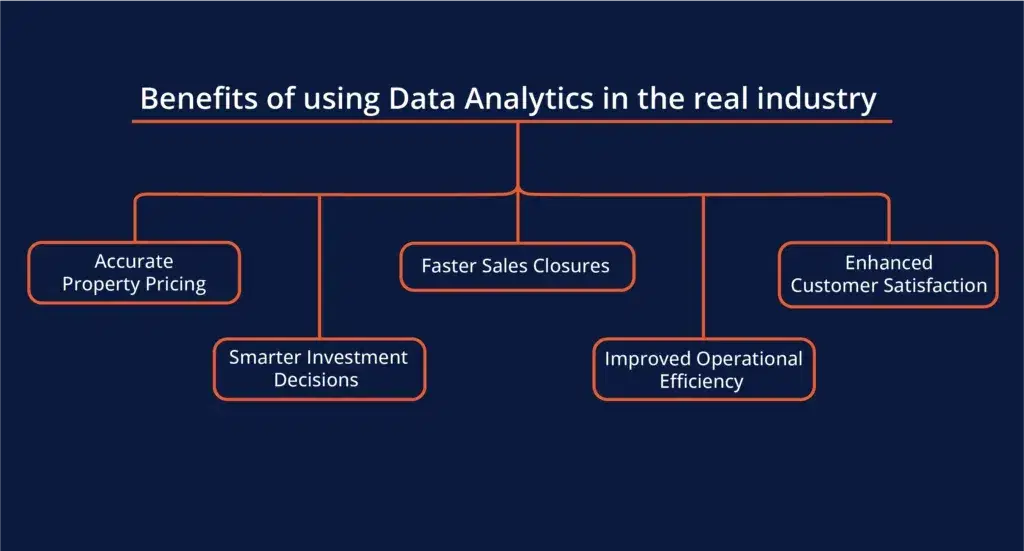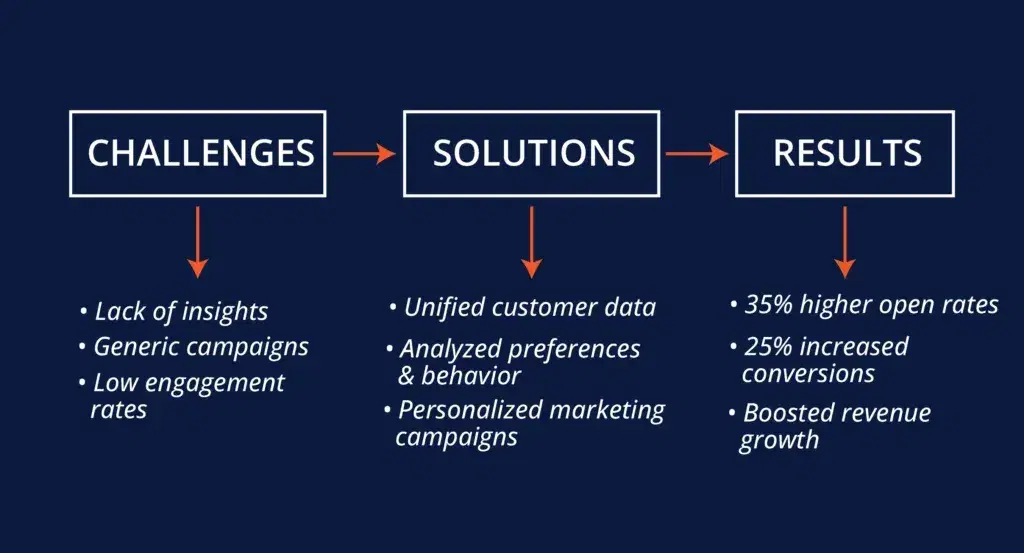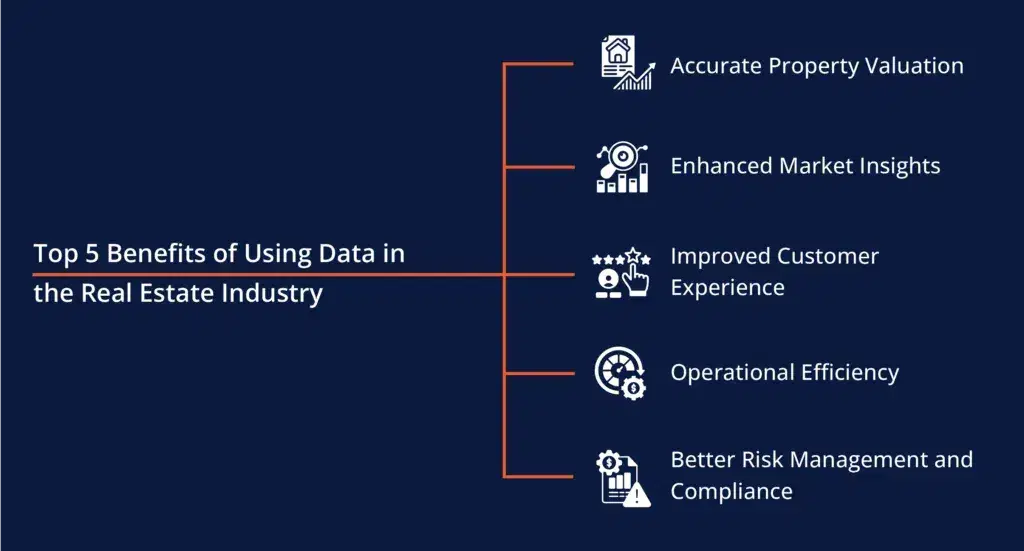Introduction:
How Regularly Use of Data Analytics in the Real Estate Industry Can Benefit You?

- Accurate Property Pricing
- Smarter Investment Decisions
- Faster Sales Closures
- Improved Operational Efficiency
- Enhanced Customer Satisfaction
5 Real Life Scenarios for Common Challenges with Effective Solution
1. Analyze Every Corner with Data Analytics
- Challenge: A leading real estate firm struggled to predict property value changes due to fluctuating market trends, neighborhood developments, and seasonal factors. They lacked a data-driven way to assess long-term ROI on property investments.
- Solution: Data analytics was deployed to analyze historical sales, local economic trends, crime rates, and school district scores. Advanced predictive analytics models were built using machine learning algorithms to forecast property value appreciation or depreciation.
- Result: The firm could accurately predict property values with an 85% success rate, leading to better investment decisions and a 30% increase in client satisfaction. Real estate agents used the insights to guide clients, enhancing trust and closing deals faster.
2. Data Migration to Streamline Legacy CRM Systems
- Challenge: A real estate enterprise had fragmented data spread across multiple legacy CRM systems. Inconsistent formats and incomplete records led to inefficiencies in lead tracking and poor customer service.
- Solution: Data migration was undertaken to transfer all customer and property records into a modern, unified CRM platform. Data cleaning, deduplication, and standardization processes were employed during the migration to ensure high-quality.
- Result: The new CRM system allowed the company to access a 360-degree view of customer interactions and property listings, reducing lead response time by 50% and boosting conversion rates by 20%.
3. Data Pipelines for Automated Property Listing Updates
- Challenge: An online real estate platform faced delays in updating property listings from multiple agents and brokers. Manual processes caused data discrepancies and frequent errors in listing availability.
- Solution: A robust data pipeline was implemented to automate data ingestion from agents’ databases. The pipeline used APIs and real-time syncing mechanisms to ensure accurate and up-to-date listings on the platform.
- Result: Listings were updated in real-time, reducing errors by 90%. Customer satisfaction improved as users could trust the platform for accurate and timely property availability information. Website traffic and engagement increased by 40%.
4. Data Engineering for Personalized Marketing Campaigns

- Challenge: A real estate company lacked insights into customer preferences, resulting in generic marketing campaigns with low engagement rates.
- Solution: A data engineering solution was implemented to unify customer information from website visits, inquiry forms, and social media interactions. Using this now the team developed personalized marketing campaigns that targeted potential buyers based on their preferences, budgets, and location interests.
- Result: Personalized campaigns improved email open rates by 35% and increased lead conversion by 25%. The company’s revenue grew as it successfully matched properties to clients more efficiently.
5. ETL for Compliance Reporting and Risk Management
- Challenge: A real estate firm operating across multiple states faced challenges in complying with region-specific regulations. Manually aggregating and reporting for compliance audits was time-consuming and error prone.
- Solution: An ETL process was designed to extract data from transactional systems, transform it to meet compliance requirements, and load it into a centralized reporting system. Automated dashboards were created for real-time compliance monitoring.
- Result: The firm reduced compliance reporting time by 70%, minimizing penalties due to delayed or incorrect submissions. Risk management improved, and the company built a reputation for regulatory transparency
Top 5 Benefits of Using Data in the Real Estate Industry

1. Accurate Property Valuation
- Benefit: Data analytics helps assess property values by analyzing market trends, location factors, historical sales, and nearby amenities. This ensures accurate pricing, reducing overvaluation or undervaluation risks.
- Impact: Real estate agents and investors make informed decisions, improving profitability and customer satisfaction.
2. Enhanced Market Insights
- Benefit: Data provides real-time insights into market demand, customer preferences, and emerging trends. It enables businesses to identify lucrative investment opportunities and tailor strategies accordingly.
- Impact: Companies gain a competitive edge and adapt quickly to dynamic market conditions.
3. Improved Customer Experience
- Benefit: Data-driven personalization enables real estate firms to recommend properties that align with customer preferences such as budget, location, and amenities.
- Impact: Boosts client satisfaction and loyalty while shortening the sales cycle.
4. Operational Efficiency
- Benefit: Utilizing data pipelines and automation streamlines property listing updates, lead tracking, and compliance reporting. This reduces manual work and errors.
- Impact: Improves team productivity, cuts costs, and ensures faster service delivery.
5. Better Risk Management and Compliance
- Benefit: Data aids in evaluating risks such as market downturns or non-compliance with regulations. Centralized data systems support audit readiness and risk mitigation strategies.
- Impact: Minimizes legal and financial risks while enhancing organizational reputation.
Conclusion
Register now for your customized Property Insights Proof of Concept in just 160 hours @ no cost.














